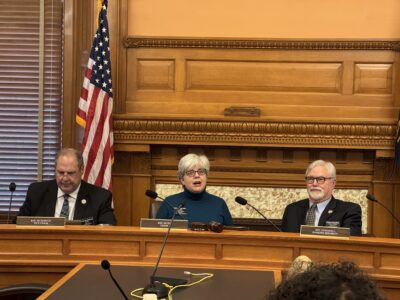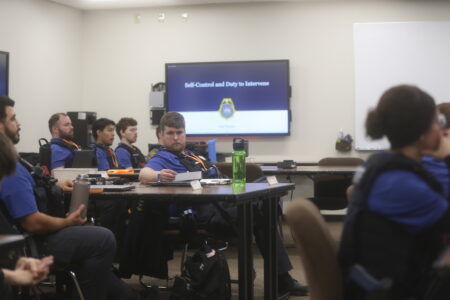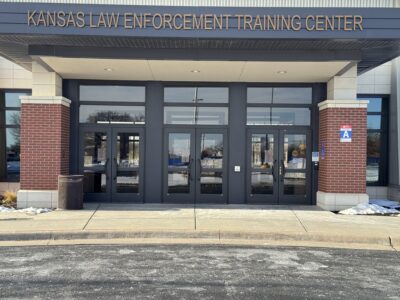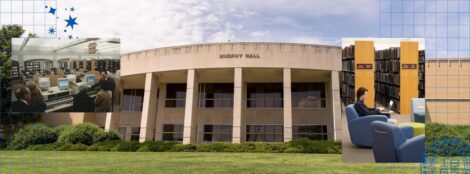KU athletic department sets revenue records but experiences $2M budget shortfall

photo by: Chance Parker/Journal-World photo
Athletic Director Travis Goff speaks at the press conference following KU's release of new plans to renovate David Booth Kansas Memorial Stadium on Aug. 15, 2023.
During the fiscal year 2024, Kansas Athletics expects to exceed its revenue projection by $3 million, but also incurred $5 million beyond its predicted expenses, resulting in a likely shortfall of approximately $2.1 million.
Athletic director Travis Goff explained at Monday afternoon’s KU Athletics board meeting that the department reached a new high-water mark in ticket sales at $26 million, driven by men’s basketball and football, and also recorded record revenue from its sponsorship deal with sports marketing firm Learfield. The department’s Chief Financial Officer Pat Kaufman added that KU also got slightly more money than expected from Big 12 Conference distributions, concessions, buyout payments from football assistant coaches getting poached, and more.
However, Kaufman said that strategic investments in the football and men’s basketball programs, including new coaching contracts, as well as department-wide facility investments and deferred maintenance, resulted in the additional $5 million in expenses. The department will cover the $2.1 million shortfall using its operating reserves.
The department was working with a break-even budget of $127 million for the fiscal year 2024 (which concludes June 30) that it approved at its June 2023 board meeting.
However, on Monday, the board did not present or approve a budget for the next fiscal year.
“We’re going to take our time and get it right — we’re still kind of working through our strategy,” said Kaufman, who cited numerous “unknowns” and “variables” in the world of college athletics, and added that a meeting will likely be called in September to approve the budget for what will then be the ongoing fiscal year 2025.
Many of those variables came under discussion at Monday’s board meeting, in particular a proposed settlement in the House v. NCAA antitrust case that would have schools create a pool of up to $20 million to share with current student-athletes. The NCAA could also have to pay out billions of dollars to past student-athletes, in part by withholding some future money from colleges.
Goff discussed the difficulty inherent in planning for the prospective “permissive cap” of $20 million, which may also bring Title IX implications.
“We’ve got two programs that drive a vast majority of the revenues, not just uniquely to KU, but across intercollegiate athletics,” he said, referencing football and men’s basketball. “We need to be competitive in those two programs … At the same time, we’ve all made a commitment and believe wholeheartedly in the commitment to non-revenue programs and the opportunities that has long provided students.”
He added that the non-revenue sports bring diverse students to campus, create “storylines” and also serve as a means of developing Olympic athletes.
Goff expressed optimism at times on Monday about KU’s positioning in light of the advent of revenue sharing. He said that the prospect of sharing revenues creates a “mandate” for alignment throughout a college’s leadership, and, “I can tell you we’re, at KU, the envy of a lot of the country in terms of that alignment and support.”
Base camp status
KU learned late last week that Lawrence, and KU’s facilities, are in contention to serve as a base camp for an international soccer team to live and train during the 2026 FIFA World Cup. Lawrence was one of the first 24 prospective locations revealed. There are two other Kansas City-based sites included.
“We’ve had numerous meetings with FIFA over the last year,” said Jason Booker, deputy AD for external affairs and revenue generation, “so it’s really cool to officially be in the base camp brochure for selection.”
Booker said that the expanded format of the World Cup, which will have 48 teams rather than the past 32, allows for a higher chance that Lawrence will be selected. However, he said that based on those meetings with FIFA, 15 to 20 possible base-camp locations will not be chosen.
“I think it just comes down to how many — will they have three host locations in one city, will they limit to two or not, those were some of the questions,” Booker said. “I think they fully believe that our facilities in a lot of ways exceed what they thought for (a) base camp.”
Facility updates
Renovations are in full swing at David Booth Kansas Memorial Stadium and Allen Fieldhouse. In a brief update, Sean Lester, the deputy AD for administration, mentioned that KU will move into a “reimagined” Anderson Family Football Complex in July. He also listed many of the ongoing improvements to Allen Fieldhouse, including more chairbacks, accessibility upgrades, a new video board, a new sound system, exterior cleaning, concourse additions and better entrances.
KU will also resurface the track at Rock Chalk Park as it prepares to host Big 12 championships next year, Lester said.
Other notes
• Goff, who recently signed a contract extension, thanked university leadership for its support.
“I don’t take it for granted or lightly that that’s not always a given,” he said, “and (it) means a lot to have a chance to partner with the kind of people we have in this room, and continue to work hard together to move KU broadly forward and certainly Kansas Athletics.”
• Goff alluded to recent stories about “things in motion out of the conference,” an apparent reference to the reporting from CBS Sports, ESPN and others last Thursday that the Big 12 Conference was considering new revenue streams from 1) a private-equity investment and 2) selling its naming rights to a company. While he didn’t want to speak much about the articles he mentioned, he praised a “continued progressive approach” from the Big 12 and its Commissioner Brett Yormark.
• After giving a brief roundup of the year of athletic accomplishments for the Jayhawks, Goff referenced milestones for the baseball, golf and softball programs, among others, and said, “I would focus and emphasize the success and the energy of our spring sports. I think this is one of the best springs we’ve had.”
• The department brought in $143.5 million in fundraising, between gifts and pledges, much of which is tied to ongoing facility upgrades to Allen Fieldhouse and the Gateway Project. Goff said that because a significant chunk of the fundraising is capital gifts, it does not show up in the operating budget. In fact, KU Athletics fell short of a particular contribution goal.
“Where we missed on a projection was on our philanthropic Ad Astra Society,” he said. “That literally one subcategory of contributions is the space where we fell short.”
Goff took responsibility for a goal he referred to, self-deprecatingly, as “ambitious and optimistic from the athletic director without much science backing it.”







